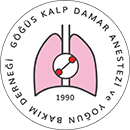

Koroner Arter Baypas Cerrahisi Uygulanan İleri Yaş ve Komorbid Bir Hastada Fast Track Anestezi ve Minimal Ekstrakorporeal Dolaşım Sistemlerinin Birlikte Kullanımı
Selma Fiş Topaloğlu1, Melek Eroğlu1, Ali Kemal Arslan2, Engin Ertürk31Sağlık Bilimleri Üniversitesi, Ahi Evren Göğüs Kalp ve Damar Cerrahisi Eğitim ve Araştırma Hastanesi, Anesteziyolojı ve Reanimasyon Anabilim Dalı, Trabzon, Türkiye2Sağlık Bilimleri Üniversitesi, Ahi Evren Göğüs Kalp ve Damar Cerrahisi Eğitim ve Araştırma Hastanesi, Kalp Damar Cerrahisi Anabilim Dalı, Trabzon, Türkiye
3Karadeniz Teknik Üniversitesi Tıp Fakültesi, Anesteziyoloji ve Reanimasyon Anabilim Dalı, Trabzon, Türkiye
Koroner arter baypas cerrahisi uygulanacak olan ileri yaş ve ek sistemik hastalıkları mevcut olan hastalarda mortalite ve morbidite riski yüksektir. Bu nedenle seçilen anestezi yöntemi ve cerrahi yaklaşım önem kazanmaktadır. Fast track kardiyak anestezi (FTKA) protokolü ile hastane ve yoğun bakım ünitelerinde kalış süresinin kısalması, dolayısıyla ileri yaş ve komorbid hastalarda mortalite ve morbidite riskinin azalması sağlanmaktadır. Son yıllarda açık kalp cerrahisinde konvansiyonel vücut dışı dolaşım sistemleri modifiye edilerek minimal ekstrakorporeal dolaşım sistemleri (MECC) kullanımı yaygınlaşmaya başladı. MECC ile konvansiyel sistemde görülen sistemik inflamatuvar cevap azaltılır. Bu yazıda, 81 yaşında komorbiditeleri olan bir hastada başarı ile uyguladığımız FTKA protokolü ve MECC kullanımı birlikteliği sunuldu. Hastaya üçlü koroner arter baypas cerrahisi uygulandı ve postoperatif altıncı gününde şifa ile taburcu edildi. Koroner arter baypas cerrahisi uygulanacak olan ileri yaş ve ek sistemik hastalıkları mevcut olan hastalarda seçilen anestezi yöntemi (FTKA) ve cerrahi yaklaşım (MECC) ile risklerin azaltılabildiği ve başarılı sonuçların elde edildiği kanaatindeyiz.
Anahtar Kelimeler: Fast track kardiyak anestezi, minimal ekstrakorporeal dolaşım sistemleri, koroner arter cerrahisi
Combined use of Fast Track Anesthesia and Minimal Extracorporeal Circulatory Systems in an Advanced Age and Comorbid Patient Undergoing Coronary Artery Bypass Surgery
Selma Fiş Topaloğlu1, Melek Eroğlu1, Ali Kemal Arslan2, Engin Ertürk31Department of Anesthesiology and Reanimation, University of Health Sciences, Ahi Evren Thoracic and Cardiovascular Surgery Training and Research Hospital, Trabzon, Türkiye2Department of Cardiovascular Surgery, University of Health Sciences, Ahi Evren Thoracic and Cardiovascular Surgery Training and Research Hospital, Trabzon, Türkiye
3Department of Anesthesiology and Reanimation, Karadeniz Technical University Faculty of Medicine, Trabzon, Türkiye
The risk of mortality and morbidity is high in patients with advanced age and additional systemic diseases who will undergo coronary artery bypass surgery. For this reason, the chosen anesthesia method and surgical approach gain importance. With the Fast track cardiac anesthesia (FTKA) protocol, the length of stay in hospitals and intensive care units is shortened, thus reducing the risk of mortality and morbidity in elderly and comorbid patients. In recent years, the use of Minimal Extracorporeal Circulatory Systems (MECC) has become widespread by modifying conventional extracorporeal circulatory systems in open heart surgery. With MECC, the systemic inflammatory response seen in the conventional system is reduced. In this article, we present the combination of FTCA protocol and MECC use, which we successfully applied in an 81-year-old patient with comorbidities. Our patient underwent triple coronary artery bypass surgery and was discharged on the 6th post-operative day with full recovery. We believe that the risks can be reduced and successful results are obtained with the anesthesia method (FTKA) and surgical approach (MECC) chosen in patients with advanced age and additional systemic diseases who will undergo coronary artery bypass surgery.
Keywords: Fast-track cardiac anesthesia, MECC, coronary artery surgery
Makale Dili: Türkçe
(486 kere indirildi)

















